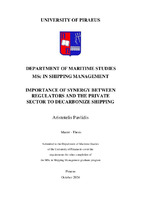Importance of synergy between regulators and the private sector to decarbonize shipping

Master Thesis
Author
Pavlidis, Aristotelis
Παυλίδης, Αριστοτέλης
Date
2024-10View/
Keywords
IMO ; The EU Regulatory Framework ; Fit for 55 ; Monitoring Reporting Verification Regulation ; Greener fuels in shipping ; EU policies ; Green corridors ; The greenhouse effectAbstract
This thesis explores, through a detailed literature and case studies, the importance of promoting cooperation between regulators and the private sector in order to achieve the goal of decarbonizing shipping. In the current era, where shipping carries over 80% of global trade and 2-3% of global greenhouse gas emissions come from international maritime transport, the responsibility of regulators and shipowners to address this phenomenon is evident. In order to tackle the greenhouse effect and reduce emissions of pollutants in shipping, the EU has moved to introduce legislative and binding policies such as the Regulation on monitoring, reporting and verification of carbon dioxide emissions from ships in shipping, (MRV), the "Fit for 55" initiative, a series of proposals aiming to reduce greenhouse gas emissions by at least 55% by 2030, as well as other European policies such as the use of alternative and renewable fuels. In addition, the paper explores the study of green corridors, routes that have been identified to reduce the environmental impact of shipping operations of ships, and the historic opportunity for Greek shipowners to become pioneers in the adoption of these corridors. This is followed by an extensive case study of leading shipping companies that have invented carbon reduction techniques, and how these strategies have been incorporated. In conclusion, the decarbonization of shipping and the transition to a more sustainable future is characterized by many challenges and can only be achieved if a coordinated strategy is drawn up and regulatory bodies/private sector work in harmony.


